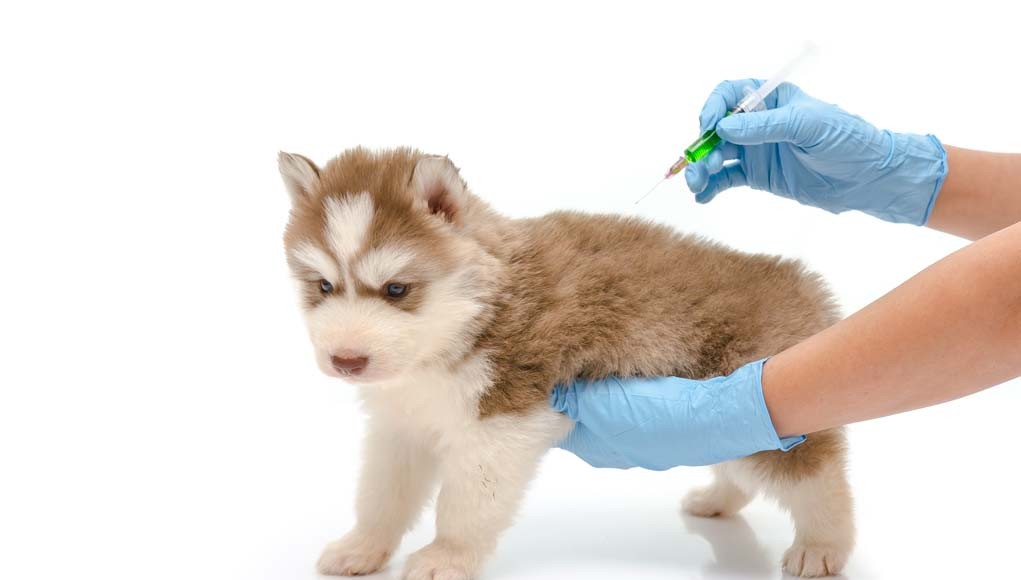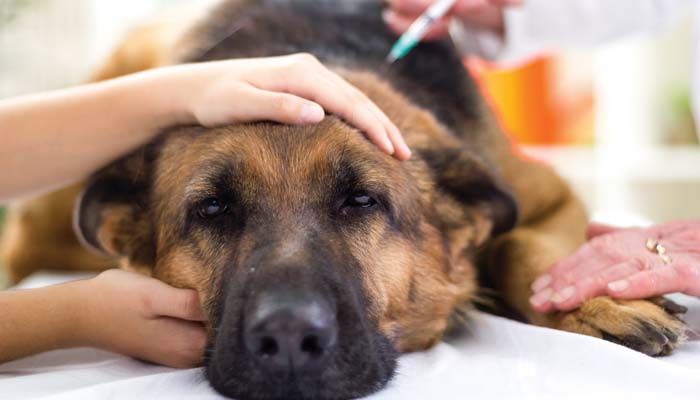 I've been on a canine health kick lately. Last week I researched the benefits and drawbacks of making your own dog food and treats. Oftentimes when discussing canine health issues with other pet parents, the topic of vaccinating your dog will come up. Honestly, I don't know a whole lot about canine vaccines other than the information that has been provided to me by our veterinarian. This week I decided to take a closer look.
I've been on a canine health kick lately. Last week I researched the benefits and drawbacks of making your own dog food and treats. Oftentimes when discussing canine health issues with other pet parents, the topic of vaccinating your dog will come up. Honestly, I don't know a whole lot about canine vaccines other than the information that has been provided to me by our veterinarian. This week I decided to take a closer look.
It's no secret that vaccinations can help your pet ward off many common diseases, but are all these vaccinations beneficial to our canine companions? Vaccinating your dog is considered to be one of the easiest ways to help him live a healthy and long life. There are different vaccines for different diseases, and there are also different combinations and types of vaccines.
Vaccinating your dog has benefits and risks that must be weighed for every pet individually in relation to his health and lifestyle.
There are core vaccines that most veterinarians will recommend, and there are also precautionary vaccines that are not required. The timing and frequency of administering vaccinations can have an effect on your dog's health, and you should consult with your veterinarian to determine the schedule that is right for your Fido.
How and When to Vaccinate Your Dog
Just like parents have a say in what vaccines their child is given, you have the right to say which vaccines your dog will receive – for the most part. Most local and state governments have requirements for vaccines, like the rabies vaccine, that all domesticated dogs must receive. You won't have a choice about these vaccinations, but you'll have a say in the rest.
The William R. Pritchard Veterinary Medical Teaching Hospital at UC Davis has published a great article on their site that explains the difference between core vaccines, those recommended for all dogs and puppies, and non-core, or optional, vaccines. It also discusses the importance of consulting with your vet about your individual dogs needs at every yearly checkup.
- These are only general guidelines, as the vaccine types recommended and the frequency of vaccination vary depending on the lifestyle of the pet being vaccinated, i.e. indoor vs outdoor pets, travel plans, kennel/boarding plans, and underlying disease conditions such as immune-mediated diseases or pre-existing infections such as FIV infection. Because these factors may change over time, we recommend the vaccination plan for each individual pet be decided by the owner at routine annual examinations, following a discussion between the veterinarian and the client regarding the animal’s lifestyle in the year ahead.
CritterAdvocacy.org includes the recommendations of Dr. Bob Rogers, DVM, in this article that explains the most common vaccination schedule recommended by the majority of veterinarians. This will give you a good idea of what you can expect with your dog and a basis to ask your vet questions if their recommendations differ from these.
Remember, vaccination schedules vary from dog to dog, and it's imperative that you do your research before speaking to your vet in order to gain the highest understanding of the vaccines that are required and which non-core vaccines would be appropriate for your pet.
- It is the consensus of immunologists and experts that the duration of immunity is much longer and probably the life of the patient. This three-year compromise interval will greatly reduce the number of antigens administered, and therefore the risk of adverse reactions, while providing the most complete protection against preventable diseases possible.
The main question that you need to ask when considering a vaccine is whether your dog needs it or not. For example, you can vaccinate your dog against Lyme disease, but if there isn't a large threat of it in your region you don't really need to. Michele Welton wrote an article for yourpurebred.com that discusses this question in detail.
In the article Welton quotes numerous studies that are full of scientific jargon and then breaks the information down into language that we can understand. It's an easy-to-read article that is full of great information that every dog owner should read before purchasing a puppy or visiting their vet for their pooch's annual checkup.
- That same article by Drs. Schultz and Phillips goes on to say: “Furthermore, revaccination fails to stimulate a secondary response as a result of interference by existing antibodies.” Again, in plain English….booster shots don't work when your dog's system already has antibodies from previous vaccinations. Existing antibodies neutralize the booster shot.
There are many questions that you should ask your veterinarian when discussing vaccinating your dog. Truth4Pets provides a great list in this article. Not only do they list some of the most important questions that you should be asking, but they also explain the importance of the question and the knowledge that you'll gain by asking it.
- Is my veterinarian recommending a combination vaccine?A Purdue study of 1.2 million dogs shows that multiple vaccines given in one visit, especially when given to a small-to-medium size dog, may greatly increase the chance of a vaccine reaction. (A second study shows risks to cats.) Multiple vaccines also make it impossible to determine which vaccine caused any subsequent reaction.
You can read more about that study here.
All of this information begs the question: are we over-vaccinating our dogs? Vaccines have certainly haulted the spread of numerous deadly disease. That's a fact, and we should definitely be grateful for that. However, our celebration must be paused to consider the adverse effects of of vaccinating your dog.
This article on CAGSPRescue's site answers that question, and the writer backs up their statements with findings from multiple studies. It's a comprehensive article that explains the dangers of over-vaccinating.
- Doctors must be willing to apply rational thinking and let go of their false assumptions if vaccines are to truly benefit their patients. They must, in fact, honor the wisdom of the sacred doctor’s oath: “First, do no harm.” And responsible dog owners must understand this: The economic health of drug companies and the doctors they seduce have no place in your dog’s life!
This blog on angryvet.com discusses the large increase in the number of vaccinations given to pets in recent years. The author believes that some vaccinations are necessary, but warns about the many dangers of giving your pet an unnecessary vaccine. The article focuses on providing a healthy lifestyle for your pet through good nutrition and a clean environment, thus reducing the chance of sickness and disease.
In this blog post by
- According to Dr Jean W Dodds, an eminent vet and researcher, both allergic and autoimmune diseases have been rising since the introduction of modified live virus vaccines. Autoimmune diseases are where the body attacks self; they include cancer, leukaemia, thyroid disease, Addisons, Grave’s disease, autoimmune haemolytic anaemia, rheumatoid arthritis, diabetes, lupus, thrombocytopenia, organ failure, skin inflammations, and more.
Some pet parents have begun to worry about the link between vaccinations and cancer. As I mentioned earlier, the number of vaccines given to pets has been growing in recent years and the rate of cancer has as well. Demian Dressler, DVM, wrote this article for the Dog Cancer Blog that explains how detrimental vaccines can be to dogs who currently have cancer.
But is there any proof that vaccinations cause cancer? Dr. Dressler explains that there hasn't been much research performed on the subject, but there are some suspicions and red flags. Among others, he says this:
- This polarity shift pulls the immune system away from cancer surveillance later in life (shown in rodents anyway), and appears to be a permanent change. In other words, the immune system is primed to fight infectious disease, but at the expense of protecting or screening the body from developing cancer cells.
There are some dog owners that have turned to holistic veterinary practices when it comes to vaccinating their pets. Dr. Peter Dobias is a well-known holistic veterinarian, and he published this blog on his site that explains the difference in the holistic approach to vaccinating your dog.
If you think it's something you may be interested in, this is a great read to give you some brief background information before you decide whether or not to speak with a holistic veterinarian.
- 1. Maternal antibodies protect puppies fully until around the age of 10 – 16 weeks.
2. When your puppy is 12 weeks old get an “antibody titer test” done that is available in most veterinary clinics.
3. The most concerning diseases are distemper, parvovirus and leptospirosis. Most clinics run just the first two tests.
4. If any antibody level is present, retest at the age of 5 months and socialize your puppy on a moderate basis with other dogs.
5. Your puppy will learn the “ropes” by being in the company of other canines and will produce its own antibodies by being exposed to them while being protected. This is in fact natures “way of vaccination”
6. While no method can provide you with 100% guarantee, I have not seen any dogs who have got parvo or distemper since starting to use this protocol in the late 90’s.
If you decide to get your pet vaccinated in any way, you need to know what to expect after the vaccination. Every vaccine comes with its own risks and side effects. The last good read I'll leave you with this week is from the American Veterinary Medical Association.
This is a great read for any dog owner that is going to be having their pet vaccinated in the future. You'll learn the mild side effects that are common in many dogs and cats, and it also gives some great advice on the more serious side effects that you need to be looking out for.
Keep all of these things in mind when vaccinating your dog, and make sure to talk with your vet about any other possible side effects that you should be aware of.
- More serious, but less common side effects, such as allergic reactions, may occur within minutes to hours after vaccination. These reactions can be life-threatening and are medical emergencies. Seek veterinary care immediately if any of these signs develop:
- Persistent vomiting or diarrhea
- Itchy skin that may seem bumpy (“hives”)
- Swelling of the muzzle and around the face, neck, or eyes
- Severe coughing or difficulty breathing
- Collapse














